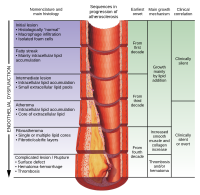
Photo from wikipedia
Abstract Increased carotid intima-media thickness (IMT) in individuals without hypertension might indicate other factors promoting the atherosclerotic process that are often simultaneously clustered in individuals. The present study tested the… Click to show full abstract
Abstract Increased carotid intima-media thickness (IMT) in individuals without hypertension might indicate other factors promoting the atherosclerotic process that are often simultaneously clustered in individuals. The present study tested the hypothesis that carotid IMT predicts new onset of hypertension in the normotensive subjects. A total of 867 participants were enrolled from our yearly physical checkup program and their carotid IMT was measured. After a baseline examination, the subjects were followed up for a median of 1091 days with the endpoint being the development of hypertension. At baseline, the carotid IMT value was 0.75 ± 0.16 mm. Hypertension developed in 184 subjects during the follow-up (76.9/1000 person-years). The incidence of hypertension was increased across the tertiles of the carotid IMT value (39.6, 70.0, and 134.5/1000 person-years in the first, second, and third tertiles, respectively, P < .001 by log-rank test). Multivariate Cox-hazard analysis after adjustment identified carotid IMT, taken as a continuous variable, as a significant predictor of new-onset hypertension (hazard ratio = 7.08, 95% confidence interval = 3.06–15.39). Furthermore, multivariate linear regression analyses indicated a significant correlation between the carotid IMT at baseline and yearly increases in systolic blood pressure during the follow-up period (&bgr; = 0.189, P < .001). Carotid IMT is an independent predictor of hypertension onset in normotensive subjects. The findings also suggested a close association between increased carotid IMT and blood pressure.
Journal Title: Medicine
Year Published: 2017
Link to full text (if available)
Share on Social Media: Sign Up to like & get
recommendations!